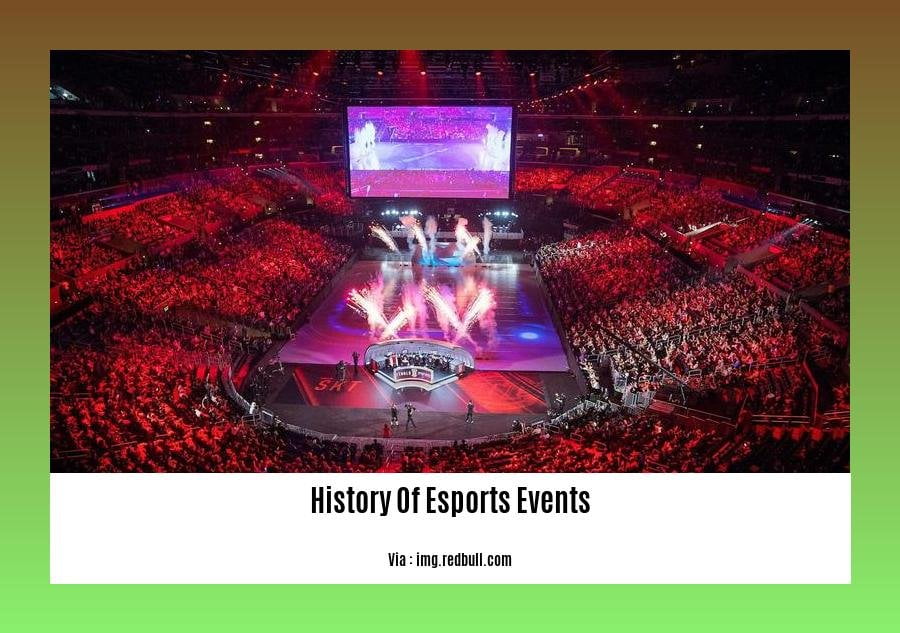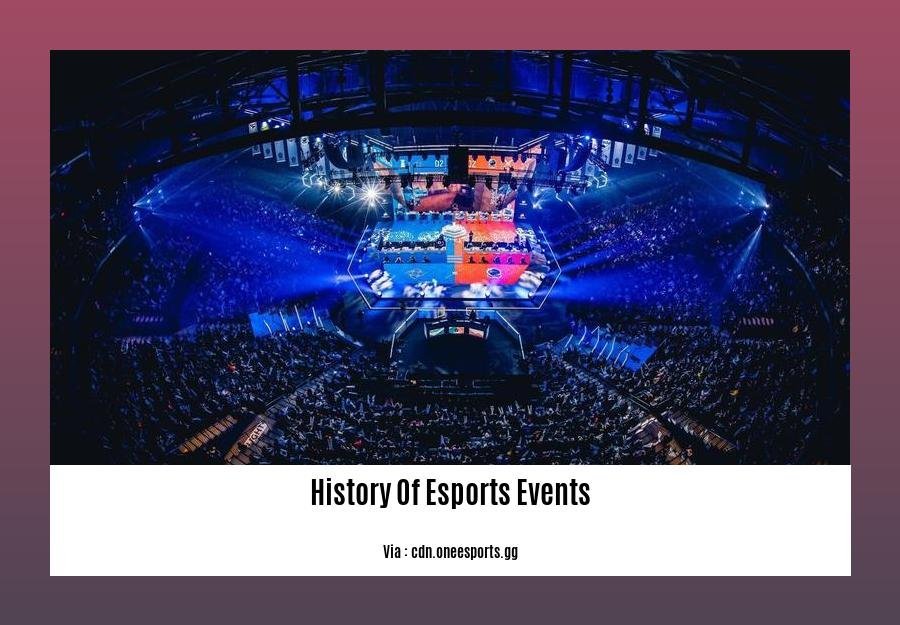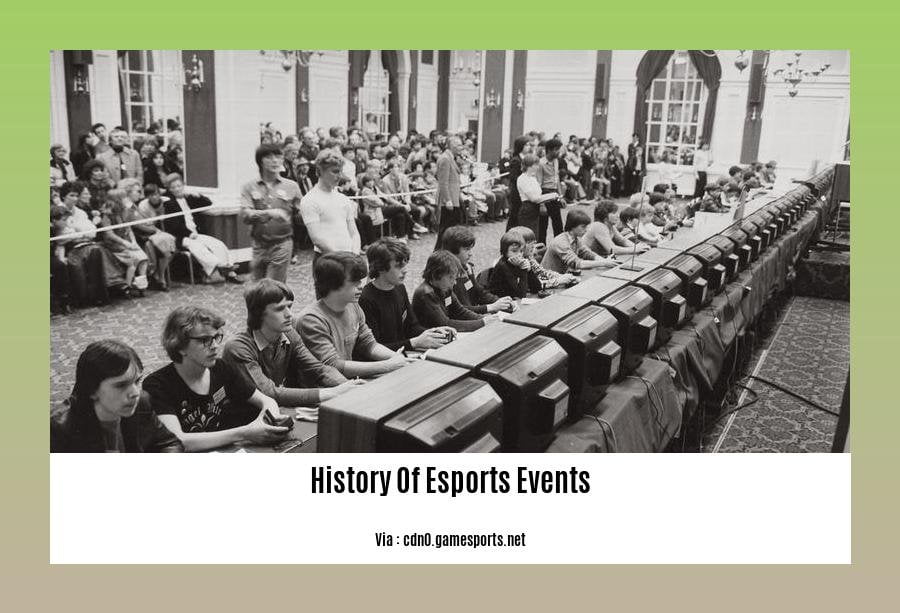A Journey Through Time: The History of Esports Events – Dive into the fascinating evolution of esports events, from their humble beginnings in dimly lit LAN parties to the spectacular extravaganzas that captivate millions worldwide. Witness the rise of iconic tournaments, the emergence of legendary players, and the technological advancements that transformed esports into a global phenomenon. Explore the captivating stories of triumph, heartbreak, and the indomitable spirit of gamers who defied expectations and shaped the very essence of competitive gaming.
Key Takeaways:
- In 1990, the Nintendo World Championships marked the first major video game event.
- The introduction of multiplayer online games in the 2000s revolutionized gaming, leading to the growth of esports tournaments and leagues.
- In the 2010s, esports gained mainstream recognition and legitimacy, attracting major corporations and investors.
- The rise of streaming platforms like Twitch and YouTube Gaming further popularized esports and attracted new viewers.
- Game developers began to actively support and promote competitive gaming, providing funding and creating in-game features that facilitated esports.
- Twitch emerged as the dominant streaming platform for esports, attracting millions of viewers to major tournaments and events.
- Recent major esports tournaments have attracted millions of viewers and generated huge prize pools, such as The International (Dota 2), League of Legends World Championship, and Fortnite World Cup.
History of Esports Events

Esports has taken the world by storm, evolving from humble beginnings to a global phenomenon. History of Esports Events is about the captivating journey of competitive gaming, from early tournaments to the grand spectacles of today.
### LAN Parties: The Genesis of Esports
In the 1990s, gaming enthusiasts gathered at LAN (Local Area Network) parties, connecting their computers to compete in multiplayer games. These grassroots events were the breeding ground for the competitive spirit that would shape esports’ future.
### Online Multiplayer Games: The Catalyst for Growth
The advent of online multiplayer games in the 2000s was a game-changer. Titles like ‘Quake’ and ‘Counter-Strike’ allowed players to compete from anywhere, fostering a global community of dedicated gamers.
### Professionalization and Major Tournaments
The 2010s marked a turning point as esports gained mainstream recognition. Major tournaments like The International (Dota 2), League of Legends World Championship, and Fortnite World Cup attracted millions of viewers and generated massive prize pools, propelling esports into the limelight.
### Streaming Platforms: The Gateway to Popularity
The rise of streaming platforms like Twitch and YouTube Gaming played a pivotal role in popularizing esports. These platforms allowed fans to witness the action live, creating a sense of community and excitement that further fueled the growth of esports.
### Developers Embrace Esports: A Symbiotic Relationship
Game developers recognized the potential of esports and began actively supporting competitive gaming. They provided funding for tournaments, created in-game features facilitating esports, and worked with organizers to establish a sustainable ecosystem.
### Challenges and the Road Ahead
Esports has faced challenges along the way, including controversies surrounding game integrity, player well-being, and the need for stronger regulations. However, the industry has shown resilience, constantly adapting and evolving to address these issues.
### The Future of Esports Events: Boundless Potential
The future of Esports Events is incredibly promising. With technological advancements, immersive experiences, and the continued support of developers and sponsors, esports is poised to reach even greater heights.
The History of Esports Events is a testament to the transformative power of competitive gaming. From humble LAN parties to global spectacles, esports has come a long way and continues to captivate audiences worldwide.
With a humble beginning, Esports tournaments have come a long way. If you want to know the history of esports tournaments, click and explore its fascinating journey from the early days to the present. The story of Esports is a tale of innovation, perseverance, and triumph. From small gatherings of enthusiasts to massive arenas filled with roaring crowds, find out how Esports has evolved and established itself as a global phenomenon. Discover the list of esports tournaments that have shaped the industry and brought together some of the greatest players. Immerse yourself in the thrill and excitement of these tournaments, and learn about the strategies and skills that have led to victory.
Have you ever wondered what sets esports tournaments apart from traditional sports events? Dive into the world of esports tournaments and explore their unique features. Discover the different formats, game titles, and competitive structures that make esports competitions so captivating. Witness the rise of professional esports players and teams, and learn how they train, strategize, and compete at the highest levels. Unravel the factors that contribute to the massive popularity of esports tournaments and understand why they have become a global sensation.
Buckle up for an adrenaline-fueled ride as we take you through the biggest esports event in history. Relive the moments of glory, heartbreak, and triumph that unfolded at this legendary event. Meet the exceptional players who etched their names in esports history and witness the awe-inspiring displays of skill and determination that captivated audiences worldwide.
Challenges faced by esports tournaments: Lack of regulation, Stigma
Amidst the glitz and glam of esports’ meteoric rise, there lurk formidable challenges that threaten its legitimacy and hamper its true potential. The absence of a unified governing structure and a regulatory framework creates a Wild West-like atmosphere, leaving tournaments vulnerable to controversies. Tournament integrity is compromised by match-fixing scandals and doping allegations, eroding the trust of players and spectators alike.
Furthermore, the stigma associated with gaming persists, hindering esports’ recognition as a legitimate sport. This prejudice stems from misconceptions and stereotypes that portray competitive gaming as a frivolous pastime, devoid of athleticism and strategy. Consequently, esports struggles to gain widespread acceptance and support from mainstream media and traditional sports organizations.
Navigating the Murky Waters of Esports Tournaments
Esports events, often characterized by their high-stakes nature and substantial prize pools, face a unique set of hurdles. The lack of regulation can lead to disputes over player contracts, copyright infringement, and revenue distribution. The absence of clear guidelines and standardized rules creates an uneven playing field, leading to confusion and dissatisfaction among participants.
Busting the Stigma: Redefining Gaming’s Image
The stigma attached to gaming remains a formidable barrier to esports’ mainstream acceptance. This preconceived notion that gaming is a solitary, sedentary activity devoid of physical prowess or mental acuity perpetuates the misconception that esports lacks legitimacy as a sport. To shatter this stigma, esports needs to shed its negative connotations and embrace its positive attributes—the strategic thinking, quick reflexes, and intense competition that mirror traditional sports.
Key Takeaways:
- The lack of a unified governing body and regulation in esports creates challenges in ensuring tournament integrity and consistency.
- Match-fixing scandals and doping allegations undermine the credibility of esports and erode trust among players and spectators.
- The stigma associated with gaming hinders esports’ recognition as a legitimate sport, limiting mainstream appeal and support.
- The absence of clear guidelines and standardized rules leads to disputes over player contracts, copyright infringement, and revenue distribution.
- Esports needs to dispel the stigma surrounding gaming by highlighting its strategic elements, athleticism, and competitive nature.
Citations
[1] Governance challenges in esports: A best practice framework for esports governance
[2] Five common challenges when organizing online e-sports tournaments – Reed Smith
The Current Landscape of Esports Events: Major Tournaments, Popular Games, Notable Players

Alright, get ready to dive into the electrifying world of esports events! Buckle up as we explore the major tournaments, popular games, and the legendary players who make this realm thrive. Trust me; it’s a spectacle that’ll leave you on the edge of your seat.
Key Takeaways:
- 2023 witnessed record-breaking viewership for esports events, with League of Legends World Championship leading the pack.
- 2024 promises an exciting lineup of tournaments, featuring the biggest names in esports.
- Dota 2, Counter-Strike: Global Offensive, and Valorant continue to be fan favorites in the esports scene.
- Pro players like N0tail, s1mple, and Faker have cemented their place in esports history with their exceptional skills and achievements.
- Esports events offer a unique blend of intense competition, captivating storylines, and a passionate community that’s second to none.
Blockbuster Esports Tournaments:
Esports tournaments have become grand stages where the best of the best go head-to-head in adrenaline-pumping matches. In 2023, we saw the League of Legends World Championship shatter viewership records, with over 6 million people tuning in to witness the crowning of the new world champions. The Dota 2 The International, Counter-Strike: Global Offensive IEM Katowice, and Valorant Champions also attracted massive audiences and generated incredible excitement among fans worldwide.
2024 promises to be even bigger and better, with these major tournaments returning alongside a host of new and exciting events. Get ready for non-stop action, jaw-dropping plays, and the thrill of victory and agony of defeat as teams vie for glory and a share of the multi-million-dollar prize pools.
Popular Games Taking Center Stage:
If you’re wondering which games are the stars of the show in esports, look no further than Dota 2, Counter-Strike: Global Offensive, and Valorant. These titles have captivated millions of players and spectators alike with their strategic depth, intense gameplay, and ever-evolving meta.
In Dota 2, teams of five players engage in a battle of wits and skill, where every hero has unique abilities and the right strategy can turn the tide of battle in an instant. Counter-Strike: Global Offensive pits terrorists against counter-terrorists in a tactical shooter where every bullet counts. And Valorant brings a unique blend of gunplay and character abilities to the forefront, creating a dynamic and fast-paced experience.
Notable Players Making History:
The world of esports boasts a pantheon of legendary players who have etched their names into the annals of history with their incredible skill and achievements.
- Dota 2: Johan “N0tail” Sundstein, a Danish player known for his exceptional leadership and innovative strategies, has led his team OG to two consecutive The International victories, a feat unmatched in Dota 2 history.
- Counter-Strike: Global Offensive: Oleksandr “s1mple” Kostyliev, a Ukrainian prodigy, has dominated the CS: GO scene with his lightning-fast reflexes, pinpoint aim, and unmatched game sense.
- Valorant: Kim “Faker” Tae-sang, the “Uncrowned King” of League of Legends, has brought his legendary status to Valorant, showcasing his unparalleled mechanics and strategic prowess on a new stage.
These players, along with many others, continue to inspire and entertain fans with their incredible performances and unwavering dedication to their craft.
The Magic of Esports Events:
Esports events are more than just competitions; they are cultural phenomena that bring people together from all walks of life. The passion, energy, and camaraderie shared by fans are simply awe-inspiring. Whether you’re watching from the comfort of your own home or immersed in the electric atmosphere of a live event, esports offers an unforgettable experience that leaves you wanting more.
So, if you’re not already a part of the esports revolution, now’s the time to dive in. Prepare to be amazed by the skill, strategy, and sheer spectacle of these incredible events. Who knows, you might just find yourself cheering for your favorite team or player as they make history!
Sources:
Most Viewed Esports Events of 2023
The Future of Esports: Potential for Growth, Challenges to Overcome
In the competitive landscape of esports, you’ll find a fusion of agility, strategy, and captivating narratives. It’s a global phenomenon that continuously evolves, presenting both tremendous growth potential and intricate challenges.
The esports industry is projected to reach new heights, with annual revenue poised to exceed $1.38 billion by 2025. This surge in popularity can be attributed to several factors:
Technological Advancements: The development of 5G networks, enhanced graphics, and virtual reality technology is fueling a more immersive and interactive experience for gamers and spectators alike.
Increased Accessibility: The rise of mobile gaming and the accessibility of online platforms have opened doors for a broader audience, expanding the esports community and fostering inclusivity.
Mainstream Recognition: Esports has gained mainstream recognition, securing sponsorships from renowned brands and attracting traditional sports enthusiasts, leading to increased visibility and legitimacy.
Yet, despite the promising trajectory of esports, it faces several obstacles that hinder its progression:
Lack of Regulation: The absence of a unified governing body and standardized regulations can lead to disputes, player exploitation, and integrity issues, jeopardizing the long-term sustainability of the industry.
Monetization Challenges: Esports organizations struggle to establish a stable revenue model. While sponsorships and media rights contribute, the industry seeks innovative ways to generate sustainable income streams.
Balancing Competition and Entertainment: Striking a balance between competitive integrity and entertainment value remains a challenge. The integration of storytelling and captivating narratives can enhance the spectator experience without compromising the core principles of esports.
Key Takeaways:
Growth Drivers: Technological advancements, increased accessibility, and mainstream recognition contribute to the projected growth of esports.
Challenges: The industry grapples with the lack of regulation, monetization hurdles, and the delicate balance between competition and entertainment.
Opportunities: Addressing these challenges will pave the way for esports to harness its full potential and establish itself as a mainstream sport, attracting a wider audience and securing long-term viability.
Sources:
Esports: Bridging the worlds of gaming and entertainment – Emirates
FAQ
Q1: When and where was the first major video game tournament held?
A1: The first major video game tournament, the Nintendo World Championships, took place in 1990 in the United States. It featured competitions in Super Mario Bros, Tetris, and Rad Racers.
Q2: What was the impact of multiplayer online games on the growth of esports?
A2: The introduction of multiplayer online games in the 2000s revolutionized the gaming landscape, allowing players to compete against each other from anywhere in the world. This led to the growth of esports tournaments and leagues, attracting a global audience.
Q3: How did esports gain mainstream recognition and legitimacy?
A3: Esports began to gain mainstream recognition and legitimacy in the 2010s, as major corporations and investors began sponsoring teams and tournaments, and prize pools grew exponentially. The rise of streaming platforms like Twitch and YouTube Gaming also helped to popularize esports and attract new viewers.
Q4: What are some of the challenges faced by esports in terms of governance and regulation?
A4: Esports lacks a unified governance structure and an international governing body, which can lead to challenges in regulating the industry and ensuring consistency and fairness in competitions. Additionally, there are ongoing debates about the legal recognition of esports as a sport, and the lack of regulation can result in legal disputes and uncertainty regarding player contracts, intellectual property rights, and revenue sharing.
Q5: What are some of the technological disruptions that have affected esports events?
A5: Esports events are susceptible to technological disruptions, particularly when athletes compete from their homes. High bandwidth and low latency internet connections are crucial for smooth gameplay, and online tournaments can be vulnerable to DDoS attacks and other forms of cyberattacks that can compromise sensitive data and disrupt competitions.
- China II Review: Delicious Food & Speedy Service - April 17, 2025
- Understand Virginia’s Flag: History & Debate - April 17, 2025
- Explore Long Island’s Map: Unique Regions & Insights - April 17, 2025
















